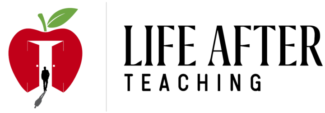Welcome this real life interview from former teacher Gillian Culff! After earning her degree from Sarah Lawrence College and teaching high school English for ten years, Gillian began freelance writing, consulting, and speaking. She now writes and consults full-time and you can read more about her amazing background here.
Please describe your teaching experience and educational background.
I earned a B.A. in liberal arts from Sarah Lawrence College, where I studied psychology and political science and did field work in child development at the Sarah Lawrence College Early Childhood Center. However, I had no idea I was going to become a teacher and did not get any sort of teaching degree or certification.
I began teaching high school English, creative writing and Student Council in the 2004-2005 school year at a small, private school in Hawaii. I taught there for ten years. In my second year I became the yearbook advisor as well.
I loved teaching; the variety of courses I taught was great, and I enjoyed being on my feet interacting with kids a lot. I grew a lot as a teacher and an individual in those years. With no real training I figured out how to teach high school English and help students improve their writing and critical reading and thinking skills. I enjoyed reading student writing, but I hated having to put a grade on it. That has always been antithetical to my own philosophy of learning. That’s why I went to a college with no grades. That part of the job always chafed at me.
When did you realize teaching was no longer right for you? Was there a specific moment or did it dawn on you slowly?
I think it dawned rather slowly as I struggled to handle the ever-burgeoning load of paperwork and department work. In fact, every year, my review was excellent, but I was always given the same constructive feedback: I needed to assign more work, and I needed to turn back work to my students more quickly.
If you think about this for even a minute, you can see how these two goals are at odds with each other. Along with the grading, these two areas dogged me continually.
However, there came a moment when I realized I hadn’t truly been happy for a while. I was working with a life coach to find out how I could feel more fulfilled in my life overall, and I was teaching my students a new unit I had designed on the Hero’s Journey. I was standing in front of my classroom telling my students to go out and live their own hero’s journey, when I realized I was no longer living mine. It was an epiphany, the classic hero’s call to adventure. It finally dawned that I wasn’t enjoying teaching as much anymore. I had been changing up my texts and units of study year to year, and I was still restless and a little bored, even with the teaching itself, which was the part I’d always loved.
Ironically, after years of stress and struggle—including building strong student council and yearbook programs, both of which had a steep learning curve at first— having finally arrived at a point of mastery and confidence in my abilities, I was no longer feeling challenged by the work. Simultaneously, the stress of always being behind in my grading was tipping the balance toward dissatisfaction as I realized this was not an area where I’d ever improve sufficiently to satisfy myself or others.
What position do you have now?
I started my own business as a freelance writer, editor and teacher of writing classes. I am working on a book and course series wherein I use ancient philosophical texts as inspiration for writing exercises to help people reflect on their lives and grow spiritually. In terms of my writing, I specialize in profiles of people and places as well as web copy.
Why do you think you got this job?
I come from a family of entrepreneurs; when I was a child, my dad started a corporation that manufactured kitchen cabinet fronts using a—at that time– new laminating process. My mom had always been self-employed as a singer and in later life started teaching voice lessons. When she turned 80 she wrote a book and started a business teaching people to overcome stage fright.
My sister and brother in-law have together built numerous businesses, including a dot com that was hugely successful during the bubble of the 90s, a multifaceted and highly successful and diversified real estate and property management business, and now a web development company.
I felt encouraged by my life coach and my family members to take the leap. I knew my experience and expertise supported my being successful at it; just how successful would depend on my personal resources, perseverance and motivation.
What do you miss about teaching?
I miss the daily interaction with my students and colleagues, the energy in the building, the joy of watching my students rehearse a pep rally or talent show and overall just being a part of something bigger than myself that has a culture of family. The school where I taught is a very loving place, and I will always remain in touch with many of my students and former students.
What do you NOT miss about teaching?
I don’t miss the heaps of paper work I could never seem to get a handle on or having to tell a kid that his paper was a “D” or a “C” or a “B-.” Grading is so reductionist and distracts students from what really matters, which is the process of improvement.
I don’t miss proctoring standardized tests, but fortunately, our school had few of those, not like public schools. I think the move towards more and more testing and teaching to the test is a disaster and a completely wrongheaded approach to education.
What surprises you most about life after teaching?
I was surprised by not only how much courage it takes to start your own business, but the continued renewed courage one needs to keep going, along with the difficulty in having to motivate oneself to go after or generate work without anyone hanging deadlines over my head.
What advice would you give to a teacher who is afraid to leave the familiarity of the classroom for another job?
If you aren’t happy and are just “phoning it in,” you aren’t doing yourself or your students a service.
One fear can be giving up paid summer breaks, but if you are motivated enough to build a business on your own terms, you can structure your vacations however you want or simply allow yourself more time each day so that you aren’t a walking ball of stress.
Teachers need three months off because they are pushed to the brink of burnout each school year and need time to refresh and renew themselves.
But if your daily life is less stressful because you’ve been able to structure it that way, you don’t need three months of recuperative leisure, and your work life overall feels more manageable and reasonable.
Thank you so much for sharing your insights, Gillian!

